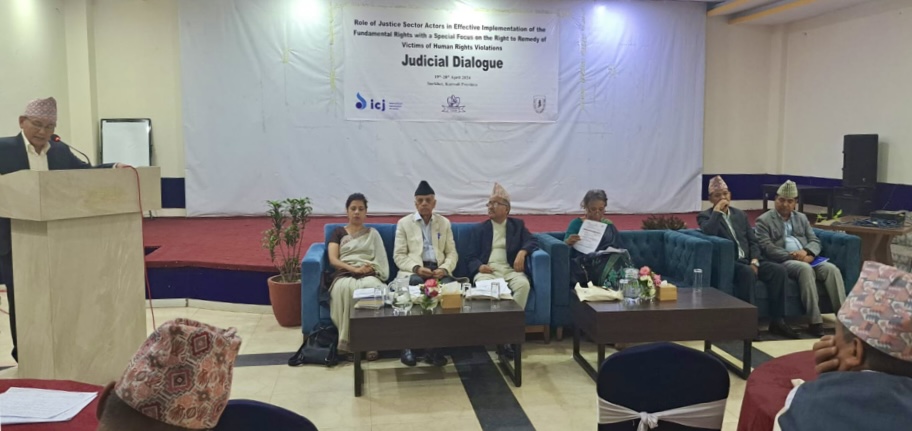At a Judicial Dialogue convened in Surkhet, Karnali Province, on 19 and 20 April 2024 by the International Commission of Jurists, Advocacy Forum Nepal and the Judges’ Society Nepal, some 45 judges and prosecutors from district and appeal courts in Karnali and Lumbini province, evaluated the numerous obstacles to the pursuit of justice for victims and survivors of human rights violations and abuses during Nepal’s 1996-2006 armed conflict.
Participants considered the pivotal role of justice sector stakeholders in the effective enforcement of human rights law, including the right to effective remedy and reparation for victims and survivors. Participants expressed frustration over the persistent failure of State authorities to implement Supreme Court rulings on question of transitional justice, as well as the glaring deficiency in aligning transitional justice laws with Supreme Court jurisprudence mandates and international law and standards.
Dr. Mandira Sharma, ICJ Senior International Legal Adviser, stressed that victims and survivors of conflict violations and abuses were often denied ordinary access to justice under the pretext that justice must await the operation of long delayed transitional justice mechanisms. She highlighted concerns raised by victims, survivors, and civil society groups regarding draft legislation currently under consideration by parliament:
“Transitional Justice embodies a holistic approach. When carefully designed, its various mechanisms truth, justice, reparation, and prevention of recurrence complement each other in fulfilling state obligations and safeguarding the rights of victims. Nonetheless, the bill currently before parliament requires revision prior to its enactment into law, in order to lay the groundwork for the realization of a truly comprehensive application of TJ approach in accordance with international standards.”
“It is frustrating to see the executive’s indifference in implementing court decisions and prolonged delay in establishing transitional justice mechanisms. The judiciary bears a duty to ensure justice, especially when other branches of government perpetuate impunity by allowing human rights violators to evade accountability.”
Hon. Ishwor Khatiwada, former justice of the Supreme Court, and Hon. Sapana Malla Pradhan, justice of the Supreme Court, also addressed the forum. They stressed the importance for judges and prosecutors to remain steadfast in protecting human rights and delivering justice.
This gathering marked the seventh judicial dialogue in a series organized by the ICJ and its partners, aimed at engaging judges and public prosecutors nationwide to deepen their understanding of law, standards, and jurisprudence around transitional justice and to explore effective strategies to make delivery of justice a reality.
Information on the previous Judicial Dialogues can be found here, here, and here.





